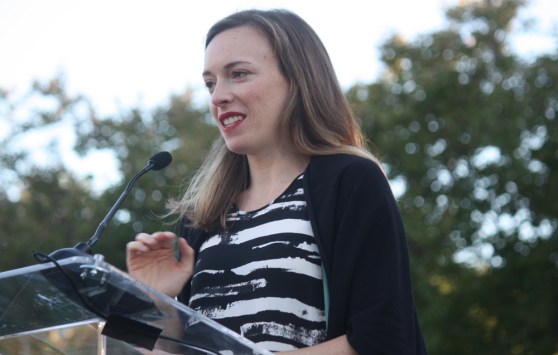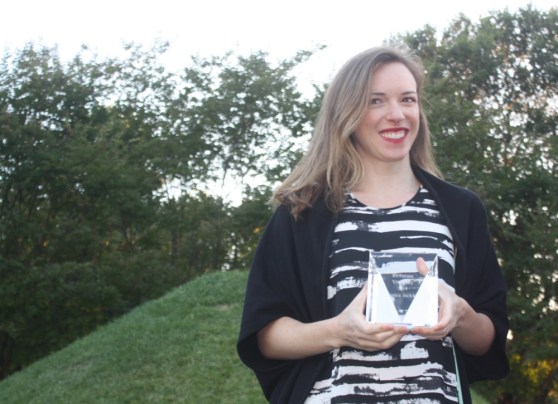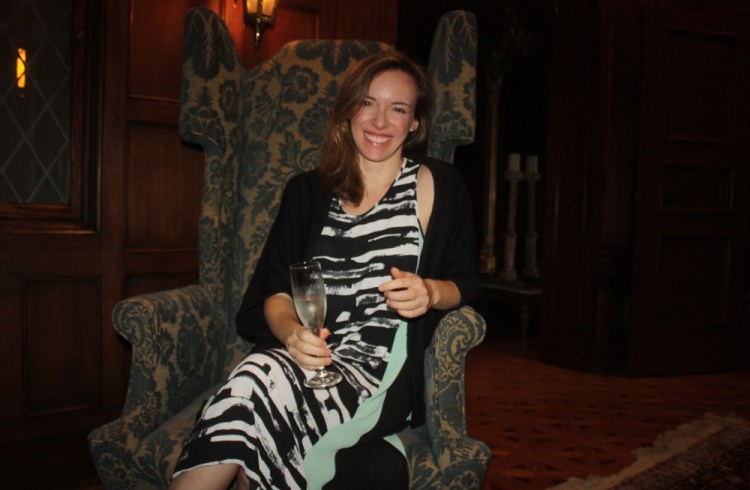Jessica Jackley, cofounder of crowdsource micro finance web site Kiva, was recently honored by the SVForum as a winner of one of its annual Visionary Awards. While other winners are entrepreneurs who have created billion-dollar companies and achieved great wealth, Jackley was honored for creating a nonprofit, Kiva, which makes small loans to entrepreneurs in developing countries. It does so by getting people to make small “micro loans” via crowdsourcing.
Kiva has now facilitated more than $500 million in loans. Jackley also started ProFounder, an equity crowdfunding platform. The Securities & Exchange Commission threatened to shut it down, so Jackley helped change the law to make it legal. The startup wasn’t successful, but it was another expression of Jackley’s belief in the power of crowdsourcing and the sharing economy.
Now the mother of 2.5-year-old twins, she is working on a startup to help parents, even though, as her husband Reza Aslan said, “it’s hard to see beyond the next diaper while tandem breastfeeding.”
In accepting her award, she said she moved from suburban Pennsylvania to Silicon Valley 14 years ago with the “opposite of a vision for my future” with a degree in philosophy and poetry. She moved into a house with a bunch of other young entrepreneurs in Palo Alto and took a job as a temp admin at Stanford’s Center for Social Innovation.
“I just knew I wanted to help people, I had a lot of questions, and this seemed like a good place to find answers,” she said. “It didn’t take long to learn this community was something special.”
She said, “People would talk all the time about the future. Then they said, let’s go make this future happen. This was the beginning of my understanding of vision and entrepreneurship, about telling a new story about the future and making it happen.” In 2003, she happened to stay late at Stanford and listened to a speech by Muhammad Yunus, before he won a Nobel Peace Prize for starting microfinance, about the “entrepreneurial poor” who want to work but just need a loan to get started.
She quit her job, moved to East Africa, and worked for the nonprofit Village Enterprise Fund, which made $100 grants. She went back to Stanford, got her MBA, and helped start Kiva.
“I had this Silicon Valley experience, and the Great Rift Valley experience,” she said. “With my work, I had the privilege of investing in companies that are part of the new sharing economy. We are moving toward this future that is more about access versus ownership, more about ours, versus mine. That’s the kind of future I want to live in.”
Quoting from Chinese inventor Lin Yutang, she said, “Hope is like a road in the country. There was never a road. But when many people walk on it, the road comes into existence.”
I caught up with Jackley for a one-on-one at the Visionary Awards. Jackley is smiling above in part because Kelly Porter’s giant dog was licking my face for most of the interview. Here’s an edited transcript of our conversation.

Above: Jessica Jackley
VentureBeat: Congratulations. You’re one of these people who’ve changed the world.
Jessica Jackley: Or so they say. Thank you.
VB: A common thread seems to be, you realized what you can do with the crowd. All of your startups are somehow making use of the crowd. When did you start realizing that? Was it back at Stanford?
Jackley: It’s funny. We weren’t using the language of crowdfunding when things started. I don’t know that that’s what I would have said starting off. It was more just, look, we can do the math. If we want to create a big impact and serve lots of entrepreneurs – the way we wanted to do that was through loans – you either have a few lenders with a lot of money or many lenders with a little money.
I grew up in a middle-class household in the suburbs outside of Pittsburgh. I didn’t grow up with a ton of resources. I certainly never wanted for anything, but it’s strange. It just seemed obvious. It takes a community, a lot of people chipping in what they can, to get something done. I’d worked in non-profits for a few years at that point, when Kiva started. I felt that because the people I knew, my people, were not necessarily people who could write a million-dollar check, the only other way to get to that total was to do it little by little.
VB: It almost seems not so intentional on your part, but you seem to have created a lot of wealth for all these people out there. Kiva’s successful as well.
Jackley: It is. It’s a non-profit, but what I love is—It’s funny. I almost said “for who?” there. But I guess I honestly say that because I feel so lucky to have gotten to do work that I love. I’ve gotten paid in a lot of currencies. Some financial, but mostly a lot of others that are very meaningful to me. I feel like a hugely wealthy person, because I’ve gotten paid in adventures and feelings of fulfillment. I’ve gotten to do things that mean something to me. I get to work with people I respect.
VB: You’ve helped express what people meant by social entrepreneurship.
Jackley: So much of my journey was at the beginning, when that was becoming more of a household phrase. But honestly, a lot of my journey has been being heads down, trying to do something, and then looking back a few years later and maybe using some term or phrase that people started to use at that point. I don’t know if I’ve coined anything. But it helps to see how the world perceives you as you go along.
I don’t mean to sound silly here, but we weren’t seeing crowdfunding at the beginning of Kiva. We weren’t sure what the most innovative element was. Was it this idea of a zero-percent loan, versus a donation or an investment? Was it getting to the concept of lots of little bits from many people? In some ways we thought, “Oh, this is the first time you’ll be able to see people blogging from sub-Saharan Africa.” There were lots of little elements we thought would be interesting and fun. We didn’t know which ones would be more important than the others.
VB: You’re in this different stage in your life, I guess. That’s something that you tend to exploit when you’re starting something. You’re a parent now.
Jackley: For a while I was feeling disappointed and frustrated and sort of stunted. Over the last few years, I was feeling a bit bad over the fact that I wasn’t, for example, in the trenches, in the field, working with very underprivileged entrepreneurs in sub-Saharan Africa or someplace like that. It took me a while that in the early days of parenting, particularly going out of the gate with two little ones at the same time, my world would become – for a very good reason – a little smaller, a little slower, a little closer to home.
For a while I was feeling bad about that, because it was different from what I had before. It wasn’t as fast-paced. No more thousands of miles a year flying around the world to dozens of countries. But I realize now that I’m in the middle of this life-changing experience, or maybe the beginning, and I’m in the trenches in a different way. The people who I’m relating to, who I experience life with, are parents. Those are the insights that are coming to me. Those are the voices I’m hearing. What’s going on with them is resonant with me. I feel like I’m smarter about this group right now than others. It is entrepreneurial. It’s the most entrepreneurial thing I’ve ever done.

Above: Jessica Jackley accepts a Visionary Award.
VB: You could view it as going on to help a different group of people.
Jackley: Exactly. I know it sounds silly, but it’s taken me a while to come to that conclusion. I feel like I was only looking at this shift and this opening up of a new season in my life as a transition away from the old opportunities, the things I did previously that were so energizing to me, the people that I had at some point decided I was meant to serve. Now I feel like I’m finally accepting it. “Oh, there’s an amazing way I can serve people to. It’s just a different cut of the entrepreneurial world.”
VB: It sounds like you’re going to launch a new startup in the coming months.
Jackley: One thing I’m starting to talk to companies about and to work with a former GSB classmate on is a consultancy to help existing large companies serve their working parents better. If you look at other countries, it seems to me that parents are more supported in their journey. Often it’s at the policy level.
I’m not sure where I believe change happens quickly and effectively. I don’t know that I want to go try to change policy right now in my life, chip away at that for the next decade. But I think helping companies change what they do, and helping individuals see and carve out and pursue a more entrepreneurial path for themselves–That’s what given me the flexibility and freedom that I’ve needed as a parent. To work at both of those levels is interesting to me. I’m just at the beginning.
VB: What is your feeling about Silicon Valley and most of the startups that do get going here? They’re mostly founded for fairly capitalistic reasons.
Jackley: I never want to be negative. I like what Tim O’Reilly said about people just pursuing the things they love. Who knows what those pursuits lead to? I do think some startups, on the surface, might look like just another attempt to do the startup thing for traditional reasons and a traditional exit. I think they’re often born out of great passion, though, and that’s wonderful to see. I don’t have any criticism there.
Tim Draper mentioned that a lot of great things happen by accident. That’s fine. You can have happy accidents along the way, but toward a different goal, in the midst of pursuing a different goal.
The truth is, I think sometimes people in startups, even in Silicon Valley, assume that there’s only one kind of person to design for and to serve, and that’s a customer with the ability to pay. As we know, sometimes markets are broken. Sometimes non-profits exist to fill in the gaps for people who are deserving and need to be served but can’t pay directly. There are more creative business models that exist in socially-driven organizations. Applying some of that thinking to more traditional startup pursuits and products to benefit more people would be so welcome.
VB: So your hope is that maybe more people who are inspired to be entrepreneurs also think about this social route.
Jackley: I would love to see that, in two ways. One, to just set out initially to serve a different type of customer and figure out their needs and design for them. But on the other side of things, if they’re creating something great for people who have the money to pay for it, think creatively about providing that to others who don’t have that ability. Share it and spread it far and wide.


